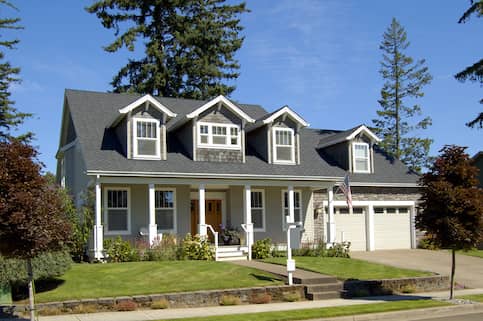If you’re ready to take the first steps to buying a home, you may be wondering whether you should purchase a new construction or older home. Newly constructed homes tend to be larger and have a more modern layout. In comparison, older homes may be located in more established and eclectic neighborhoods.
When you’re searching for the right home, you must consider the pros and cons of both old and new properties and choose the option that works best for you – which all depends on what you’re looking for and your lifestyle.
Creating a checklist of your “must-haves” may help you work through the old-house-versus-new-house debate once and for all.
What Is A New House Vs. An Old House?
As you’re shopping around for a new home, you may hear real estate agents talk about old houses versus new houses. A “new house” is one that’s just been built and not yet lived in, while an “old house” is one that’s been lived in and that may have been around for a while.
Both options have qualities that can make them appealing, so it’s important to carefully consider the differences between the two.
New-Construction Houses
A “new construction” is any home where you’re the first person to live at that residence. For instance, you may purchase an already-built home directly from the builder.
New constructions often come with modern features and technology, such as energy-efficient appliances and smart-home systems. They’re typically designed with the latest trends in mind, offering contemporary layouts and styles. Since everything is new, there’s usually less need for immediate repairs or renovations, which can be a big advantage.
Resale (Old) Homes
Old houses can have a charm of their own. They often boast unique architectural details and character that give them a special feel. From Victorian to colonial-style homes, you’re more likely to see one-of-a-kind craftsmanship.
While old homes may require some updates or repairs, many people enjoy the process of renovating an older home to make it feel more like their own. Old houses are also typically found in neighborhoods that have been around for a while and that boast a strong history as well as a sense of camaraderie among those who live in the community.
What’s Your Goal?
Buy A Home
Discover mortgage options that fit your unique financial needs.

Refinance
Refinance your mortgage to have more money for what matters.
Tap Into Equity
Use your home’s equity and unlock cash to achieve your goals.
The Pros Of New Construction
If you’re someone who doesn’t want to buy a fixer-upper, a new home might be the right choice. Plus, new builds have other advantages, including:
- Layout. Building a new home is usually done with modern families in mind. For instance, most have a family room adjacent to a spacious kitchen. This accommodates the need to have one large room where a family can spend time together.
- Amenities. A newly built home will often include updated amenities such as a pool or gym. This is a great perk because it means you don’t have to worry about paying for and driving to a fitness facility.
- Fewer repairs and maintenance costs. Buying a new-construction home over an existing home typically means you’ll have fewer repairs or renovations to do. It can be a huge relief to know that it’s unlikely you’ll have to take on any costly projects after moving in. These homes are also more likely to be in compliance with building codes.
- Better energy efficiency. New builds also tend to include energy-efficient features such as modern appliances; upgraded heating, ventilation and air conditioning systems; and new windows and insulation. This means your home will stay warmer during the winter and cooler during the summer months.
- Warranties. New construction often includes new appliances that come with warranties. Some builders even offer extended warranties on new-construction homes. These can provide peace of mind, especially for first-time home buyers.
- Customization. When you purchase a new home, you can often customize it to suit your personal needs and preferences. You may be able to choose preferences such as paint colors, open floor plans, types of appliances and whether the house is carpeted or comes with wood floors.
- Resale value. Unless this is your forever home, you’ll likely sell and upgrade homes at some point. The updated features that come with a new home can make it more appealing during the sale.
The Cons Of New Construction
While a lot of great features come with buying a newer home versus an old home, there are trade-offs as well. Here are some of the downsides to consider:
- Higher prices. The modern layouts and conveniences of a brand-new home don’t come cheap. You’ll likely pay a higher price than you would if you chose an older house. However, you may find that the square footage price is less for a new home.
- Potential HOA fees. Newer neighborhoods tend to have amenities such as pools and gyms. This means you may end up paying homeowners association fees to maintain these amenities. But having HOA fees can make it easier to maintain the value of your home.
- Less charm. Home builders want to increase their profit margin, and one way they do this is by offering a limited number of floor plans. New-construction neighborhoods tend to look very similar, and you often won’t experience the charm you’ll find in older, historic homes.
- A potentially longer commute to work and schools. Again, since builders are looking to save money, they often choose to buy land outside of the city. This could result in a longer commute to work and school.
- Limited or no negotiating room. Timing is everything when buying a home, and if you approach a builder at the end of their fiscal year, you may be able to negotiate on price. But for the most part, there’s little room for negotiation when selling new construction.
- Extensive landscaping. New-construction homes may need extensive landscaping, which can require a lot of time and money to complete.
- A drawn-out appraisal process. Lenders must use a new-construction appraisal to assess the value of an unfinished home. They also require the appraiser to visit your home again once it’s complete to verify it meets the provided specifications.
Ready To Become A Homeowner?
Get matched with a lender that can help you find the right mortgage.
The Pros Of Resale Homes
Let’s be honest: A certain charm often comes with buying an older home. You may find a spiral staircase, black-and-white tile floor and other features that are nearly impossible to find in new construction. Let’s look at some of the advantages of buying a resale home:
- More styles to choose from. Of course, houses can look similar in some older neighborhoods. In general, though, old homes in established neighborhoods tend to provide greater variety in home style types and floor plans while lacking the cookie-cutter look you often find with new homes.
- Lower prices. Older homes may require major updates. For that reason, you may be able to negotiate a lower price with the sellers or even negotiate for the sellers to pay some of the closing costs.
- Established neighborhoods. Older houses tend to be located in more established areas and have a stronger sense of community.
- The potential that large repairs have already been made. Some people claim that resale homes are money pits, but you may find houses that have already been updated. Since the house has been lived in for a long time, it’s likely most major issues have already surfaced.
- Fully grown shrubs and trees. When you purchase an older property, it’s likely the home already has mature landscaping and won’t require a ton of time for extensive upkeep. That means your outdoor space is more likely to be fully established with no seeding or planting required.
- Faster buying time. The average time it takes to buy an existing house is usually faster than purchasing new construction. That means you can close on your house and get settled much sooner.
The Cons Of Resale Homes
There’s no getting around the fact that older homes come with features you won’t find in new construction. Buying a resale home could be the right choice for you, but it’s wise to consider these downsides:
- Smaller size. In 2022, the average size of a new single-family home in the U.S. was 2,522 square feet. Older homes often come with less storage space, smaller bedrooms, no primary bedroom and notably less overall square footage.
- Less energy efficiency. A resale home was built with older building materials, meaning the windows and insulation are probably more dated. Some resale homes may even have additions that tampered with the home’s structure or even contain code violations. There are ways to make an older home more energy-efficient, but it could cost quite a bit.
- More maintenance. You may find yourself having to upgrade the roof, buy a new furnace or replace worn carpet.
- Older appliances. Unless you find one of those older homes that has been completely updated, you may also need to replace appliances.
- Fewer accessibility features. Older homes often lack the accessibility features that are more common with new construction. This may not matter to you right now, but what if an older relative needs to live with you in the future? You may have a harder time accommodating them in a dated home.
- The potential to contain hazardous materials. Until fairly recently, lead and asbestos were commonly used to construct residential homes. That means an older home could contain hazardous materials that put the health and well-being of your family at risk.
- A home warranty that may not cover replacements. Many people will purchase a home warranty to cover any necessary updates to appliances. But if the previous owner poorly maintained the appliances, your home warranty company may refuse to pay for those updates.
Take The First Step To Buying A Home
Find a lender that will work with your unique financial situation.
New Home Vs. Old Home: FAQ
Use the answers to these frequently asked questions to learn more about the differences between new and old homes.
The Bottom Line: Determine What You Need In Your Dream Home
Regardless of whether you spring for a new home versus an old home, or vice versa, buying real estate is likely to require plenty of research, patience and compromises. Making a checklist of your must-have features and sharing it with your real estate agent can help you identify what you can’t live without in a house.

Kevin Graham
Kevin Graham is a Senior Writer for Rocket Companies. He specializes in economics, mortgage qualification and personal finance topics. As someone with cerebral palsy spastic quadriplegia that requires the use of a wheelchair, he also takes on articles around modifying your home for physical challenges and smart home tech. Kevin has a bachelor's degree in journalism from Oakland University.












